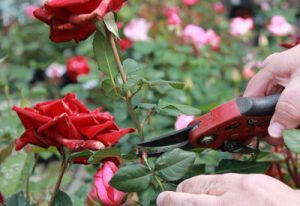Our Top Rose Care Tips
Roses need a little TLC to keep them looking their best. Follow our handy rose care tips below and enjoy beautiful blooms!
Planting
 Roses prefer a soil which has good water holding capacity but is never waterlogged. A clay loam is ideal but roses will grow in most soils. Improve light soils by digging in plenty of compost and prepare the ground by deep digging prior to planting.
Roses prefer a soil which has good water holding capacity but is never waterlogged. A clay loam is ideal but roses will grow in most soils. Improve light soils by digging in plenty of compost and prepare the ground by deep digging prior to planting.
Roses love lots of sun but they will be fine with some afternoon shade. Five hours of sunlight is adequate. Most roses won’t do well in a very windy position but they do need good ventilation. An overcrowded situation makes them more susceptible to disease. The best planting time for all rose varieties is from winter through to spring.
Pruning
Most roses should be pruned in winter while the plant is dormant, before they burst into growth and flowering. Pruned roses respond by sending out new shoots at the first sign of warm weather, so July and August is an ideal time to begin pruning. Lighter pruning in summer is also a good idea after flowering.
Pruning cuts should be made at 45 degree angles, the upper point being approximately 5mm above an outward facing growth bud to encourage the bush to grow into a more open shape. The cuts need to slope away from the bud allowing the rain water to fall cleanly away.
Deadhead
 As flowers fade they should be removed to encourage more blooms and to prevent the shrub from developing rosehips, which can inhibit flower production. Remove flowers by cutting back the stem, bearing the cut to the first strong outward facing bud. Don’t just nip the flowers off; the weak growth just beneath the spent flower will produce straggly growth. Combine this task with picking for the vase.
As flowers fade they should be removed to encourage more blooms and to prevent the shrub from developing rosehips, which can inhibit flower production. Remove flowers by cutting back the stem, bearing the cut to the first strong outward facing bud. Don’t just nip the flowers off; the weak growth just beneath the spent flower will produce straggly growth. Combine this task with picking for the vase.
Watering
Roses thrive with lots of food and water. In light or sandy soils they’ll need frequent watering. Water deeply as roses are deep rooting so water must penetrate to the lowest roots. Also, surface watering new plants will encourage too much surface root growth and make plants more susceptible to drying out. Avoid overhead watering as this makes roses more prone to disease by creating high humidity around the foliage. Give them a good soaking a few times a week.
Regular watering will be required to get plants established. Deep watering once a week is more effective than light watering. Installing an in-ground irrigation system can make the job less labour intensive and guarantee success – especially in dry shade.
Pest control
Roses benefit from a regular spray of bio feed, a compost tea which will result in a nice glossy healthy leaf, less susceptible to insects and disease. An alternate spray of organic insect spray and organic copper will prevent most insect and fungal problems. We also recommend a good winter clean up spray of lime sulphur followed by an organic copper oxy spray to give your rose a perfect start next spring.

